If the Bernese Mountain Dog-Poodle mix has won your heart, it’s likely for a variety of reasons. They’ve got the looks, the smarts, the personality, and the hypoallergenic coats. But does it all sound too good to be true? You might be wondering – do Bernedoodles shed? And are Bernedoodles hypoallergenic dogs? Or are they completely non-shedding Doods? In this article, we’re going to learn all about Bernedoodle shedding levels, causes, and how you can combat excessive shedding. Most importantly, we’ll also reveal which Bernedoodle sheds the least. Let’s dive in!
Table of Contents
- Do Bernedoodles Shed? Are Bernedoodles Hypoallergenic? Let’s Answer These Questions Once And For All
- Do Bernedoodles Shed? Comparing Bernedoodle Generations And Their Hypoallergenic Potential
- How Do You Know If Your Bernedoodle Triggers Your Allergies: Common Allergic Reactions In Humans
- Why Is My Bernedoodle Shedding So Much?
- How Do You Keep A Bernedoodle From Shedding & How To Manage Your Allergic Reactions?
- Do Bernedoodles Shed & Are They Hypoallergenic? FAQs
- Do Bernedoodles Shed & Are They Hypoallergenic? Final Thoughts
Do Bernedoodles Shed? Are Bernedoodles Hypoallergenic? Let’s Answer These Questions Once And For All
Thanks to their Poodle heritage, Bernedoodles are often considered hypoallergenic and very low to non-shedding dogs. It’s no surprise that Bernedoodles and other Poodle mixes are praised for their hypoallergenic coats, as they tend to trigger allergic reactions in people much less frequently.
However, this doesn’t mean that Bernedoodles don’t shed at all. Even Doods who have “completely non-shedding” coats shed hair. You’ll usually notice some dead, loose hair on the brush after giving them a little groom. In addition to that, some Bernedoodles can shed considerably more than their non-shedding counterparts.
On that note, it also doesn’t necessarily mean that all Bernedoodles are hypoallergenic. In fact, there isn’t even such a thing as a 100% hypoallergenic dog. Even Poodles and hairless dogs can trigger allergies in some people.
It’s important to keep in mind that it’s not the dog hair that causes allergies in people, but the proteins found in dog dander, saliva, and even urine. Now, dogs like to lick themselves, and their dander will also get stuck on their fur. Naturally, if a dog sheds a considerable amount of hair, the allergens will be left on your furniture, clothes, and ultimately trigger allergic reactions.
For this reason, low and non-shedding dogs are a much better choice for people whose allergies are triggered by dog dander and saliva. Simply because they won’t leave a mess of allergen-filled hair floating around the house.
So, are Bernedoodles hypoallergenic and under what conditions? It all boils down to a Bernedoodle’s genetics and what coat type they’ve inherited from their parent pups.
Do Bernedoodles Shed? Comparing Bernedoodle Generations And Their Hypoallergenic Potential
So, you know that you’re after a low-shedding and hypoallergenic Bernedoodle, but now you’re faced with the difficult choice – which Bernedoodle generation should you choose? Which Bernedoodle coat is best for allergy sufferers? Do Mini Bernedoodles shed? Which Bernedoodle sheds the least? And how can we predict a Bernedoodle’s hypoallergenic potential and their coat type?
Firstly, the most accurate way for this is through extensive genetic testing on the breeding dogs. Secondly, we can also have a better idea whether or not a Bernedoodle is hypoallergenic by learning about their generation.
Doodle breeders specialize in various Bernedoodle generations and picking the right one might be quite a pickle. What do all the generations mean and how can they affect a Bernedoodle’s shedding levels? Here’s a quick overview:
| 1st Parent | 2nd Parent | % Bernese Mountain Dog* | % Poodle* | |
| F1 Bernedoodle (first-generation) | Bernese Mountain Dog | Poodle | 50% | 50% |
| F1B Bernedoodle (first-generation backcross) | F1 Bernedoodle | Poodle | 25% | 75% |
| F1BB Bernedoodle (first-generation backcross backcross) | F1B Bernedoodle | Poodle | 12.5% | 87.5% |
| F2 Bernedoodle (second-generation) | F1 Bernedoodle | F1 Bernedoodle | 50% | 50% |
| F2B Bernedoodle (second-generation backcross) | F1 Bernedoodle | F1B Bernedoodle | 37.5% | 62.5% |
| F2B Bernedoodle (alternate cross) | F2 Bernedoodle | Poodle | 25% | 75% |
| F3 / Multigen Bernedoodle | F1B Bernedoodle or higher | F1B Bernedoodle or higher | Varies | Varies |

Do F1 Bernedoodles Shed? Are F1 Bernedoodles Hypoallergenic?
F1 Bernedoodles are first-generation offspring of the purebred Bernese Mountain Dog and Poodle. Are Bernedoodles hypoallergenic when they’re a 50-50 mix of the Bernese Mountain Dog and Poodle? That’s a tough one, as these pups can lean on either side of their lineage. For this reason, F1 Bernedoodles have a higher chance of shedding compared to the backcross generations.
However, it’s not uncommon for some F1 Bernedoodles to inherit a more Poodle-like, hypoallergenic coat, either. Even puppies from the same F1 litter can have different coat types! It all comes down to which coat type the puppy has inherited from its parents.
For example, if your F1 Bernedoodle has a curly coat, you’ll likely notice minimal shedding. If they’ve inherited the wavy coat, there might be a little bit of shedding. And if your F1 Bernedoodle has inherited the straight coat, be prepared for some shedding, as they usually come with undercoats.
Here are some charts from our Doodle Characteristics Survey, which over 100 Bernedoodle owners have participated in to date.
Do F2 Bernedoodles Shed?
Similarly to F1 Bernedoodles, F2 Bernedoodles are a 50-50 mix of the Bernese Mountain Dog and Poodle. As a result, there’s a 50% chance that they’ll inherit either the shedding straight coat or the low-shedding curly coat. Of course, some F2 Bernedoodles can also come with a wavy coat, that sheds slightly more than the curly coat and less than the straight coat.
Do F1b Bernedoodles Shed And Are They Hypoallergenic?
F1b Bernedoodles have a considerably higher chance of being low-shedding and hypoallergenic dogs compared to their F1 relatives. As F1b Bernedoodles have 75% Poodle and 25% Bernese Mountain Dog in their genetic makeup, it’s more likely that they inherit the low-shedding genes from the Poodle’s side of the lineage.
On the other hand, this doesn’t mean that all F1b Bernedoodles are hypoallergenic. Even F1b Bernedoodles can sometimes carry the shedding gene. Although it’s less likely, it can happen. F1b Bernedoodles are considered the best choice for people who are after a Dood who doesn’t shed much. As they tend to shed very little, they’re less likely to trigger allergic reactions. And as an added bonus, you won’t be cleaning up loose hair from your furniture or carpets.
Do F2b Bernedoodles Shed?
In terms of their genetic makeup, F2b Bernedoodles are very similar to F1b Doods. They’re 25% Bernese Mountain Dog and 75% Poodle, making them another great option for people who look for a pup that doesn’t shed much.
Are F1bb Bernedoodles Hypoallergenic?
As we learned from the Bernedoodle generations above, F1bb Bernedoodles have an even higher percentage of Poodle in their genetic makeup. F1bb Bernedoodles are 87.5% Poodle and 12.5% Bernese Mountain Dog. Because of this, there’s even a higher chance that these pups are very low-shedding and allergy-friendly dogs.
For this reason, we can consider an F1bb Bernedoodle as hypoallergenic, and these pups would make ideal pets for people who have severe dog dander allergy.
Do F2bb Bernedoodles Shed And Are They Hypoallergenic?
Similarly to F1bb pups, F2bb Bernedoodles also have a higher percentage of the Poodle in their genetic makeup. Again, it’s very likely that F2bb Bernedoodles do not shed and we can expect F2bb Bernedoodles to be hypoallergenic, making them one of the safest choices for people with dog dander allergy.
Do Mini Bernedoodles Shed? Are Mini Bernedoodles Hypoallergenic?
Whether or not a mini Bernedoodle sheds is determined by how they were bred. For instance, Mini Bernedoodles can either be created as F1 Mini Bernedoodles or by breeding backcross generations like F1b, F1bb, F2b, and F2bb Mini Bernedoodles.
Usually, we can expect some F1 Mini Bernedoodles to shed, as their genetic makeup consists of 50% Bernese Mountain Dog and 50% Poodle. This means that there’s a 50-50 chance of an F1 Mini Bernedoodle inheriting the traits from either of the parent pups.
However, with backcross generations like F1b, F1bb, F2b, and F2bb Mini Bernedoodles, there’s a much smaller chance of shedding. As we learned from the generations above, all backcross generations have at least 75% Poodle in their genetic makeup. Therefore, it’s more likely that they’ll inherit a low-shedding and hypoallergenic coat.
Do Australian Bernedoodles Shed?
Australian Bernedoodles are an interesting mix of Bernedoodles and Australian Labradoodles. Whilst Bernedoodles are a cross between the Bernese Mountain Dog and Poodle, the Australian Labradoodle combines the Labrador Retriever, Cocker Spaniel, and Poodle. And when we combine the Australian Labradoodle with the Bernedoodle, we get a quadruple hybrid cross between the Lab, Bernie, Cocker Spaniel, and Poodle. What an amazing mix!
These pups can be created in numerous ways, but the most common options are to either cross a Bernedoodle with a Multigenerational Australian Labradoodle, or mix an Australian Labradoodle with a purebred Bernese Mountain Dog.
Now, the amount of shedding an Australian Bernedoodle experiences is down to their genetics. As the Australian Labradoodle is a Multigenerational Doodle, they’re already consistently bred to achieve the lowest shedding coats possible. If these Doods are bred back to a Bernedoodle, it’s safe to assume that their Australian Bernedoodle puppies will also be rather low to non-shedding dogs.
However, if an Australian Labradoodle is crossed with a purebred Bernese Mountain Dog, things get a bit more complicated. Namely, because the Bernese Mountain Dog is a double-coated breed that can shed quite a bit. So, if we’re crossing an Australian Labradoodle with a purebred Bernie, there’s a 50-50 chance that the puppies will be born with a shedding undercoat.
How Do You Know If Your Bernedoodle Triggers Your Allergies: Common Allergic Reactions In Humans
Now that we’ve answered your question “are Bernedoodles hypoallergenic?”, let’s take a closer look at the common allergic reactions that people often experience when they’re exposed to dog dander and saliva.
As we discussed earlier, it’s not the hair that triggers allergies, but the dog saliva and dander that does it. As the dander and saliva particles are so tiny, they can easily spread around the house and into your airways with minimal trouble.
According to the Asthma and Allergy Foundation of America, about three people in 10 with allergies also have allergic reactions to cats and dogs. People with allergies have overly sensitive immune systems that will fight any harmless proteins when they come in contact. In this case, it’s the dog dander, saliva, and urine. As a result, allergic reactions occur.
The most common allergic reactions include the obvious sneezing, stuffy nose, swelling and itching of the eyes and nose. Additionally, you may also notice that your skin becomes red and itchy after your dog licks you.
In severe cases, dog allergy can manifest as an intense rash on the face, neck, and chest. Highly sensitive people may also experience wheezing, coughing, and shortness of breath. Moreover, dog allergy may trigger severe asthma attacks in people with asthma.
Why Is My Bernedoodle Shedding So Much?
If you’ve noticed that your Bernedoodle isn’t as low-shedding as you thought, it might be due to a few different reasons – mainly, their coat type and also their genetic makeup. Let’s take a closer look…
Coat Type
Bernedoodles come in three main coat types. As the Bernedoodle is a mix of two different purebred dogs, they can inherit a coat that leans on either side of their lineage, or something that is a combination of the Bernese Mountain Dog and Poodle coats.
The most desirable option for people who are after minimally shedding Doods is the Bernedoodle with a curly or wool coat. As it’s mostly inherited from the Poodle parent, it’s typically single-coated. However, the textured curls are notorious for being high maintenance, as they require regular grooming. The textured curls can easily trap in dirt and debris, and also tangle very easily.
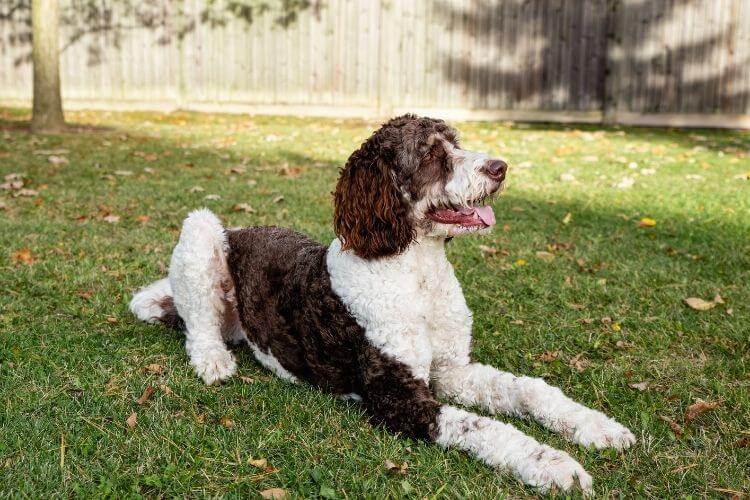
Bernedoodles can also come with a wavy coat, also known as fleece coat. It may or may not come with an undercoat, but it tends to shed very little. However, wavy coat Bernedoodles might still shed more than curly-haired Bernies. The wavy coat is typically fairly easy to maintain, as it isn’t as prone to tangles and it doesn’t shed as much as the Bernese straight coat.
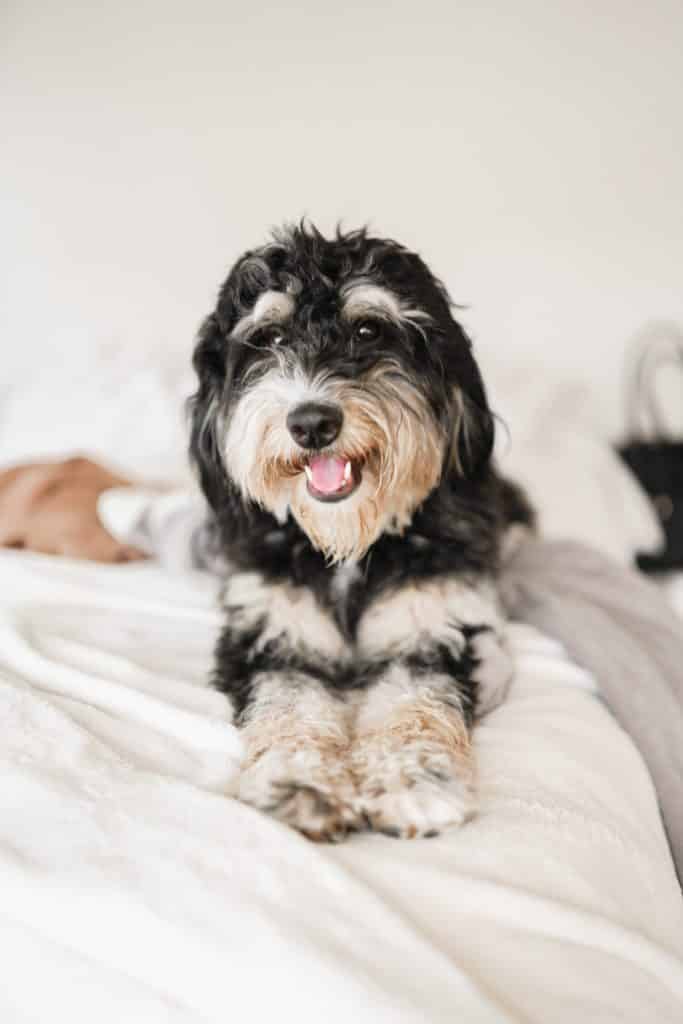
Lastly, the Bernese straight coat a.k.a. hair coat, resembles most of the Bernese Mountain Dog parent. It usually comes with a shedding double coat and it’s typically the least favorable option for allergy sufferers. The straight coat sheds the most out of all three Bernedoodle coat types. However, it’s usually much less prone to matting compared to the curly coat.
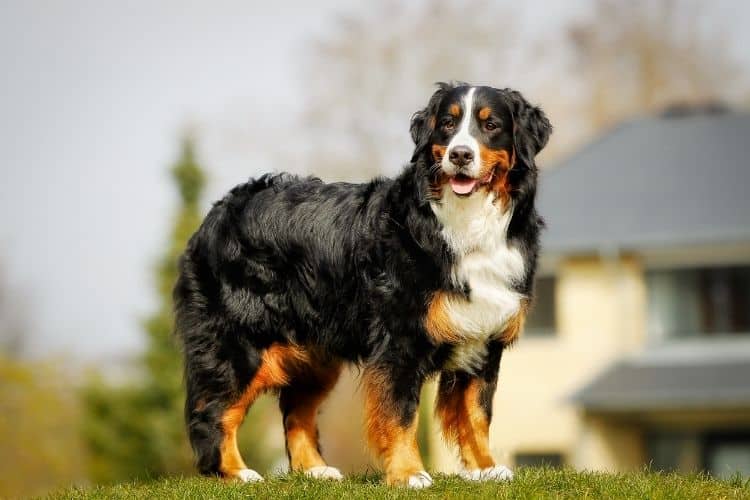
Genetics & Generation
What’s great about Bernedoodles is that regardless of their coat type or generation, they still shed considerably less than their purebred Bernese Mountain Dog parents. However, as Doodles can come in many different generations, it can greatly affect a Bernedoodle’s shedding levels.
It all boils down to how much your Bernedoodle has inherited its genes from either side of their lineage. If their genetic makeup consists mostly of the Poodle, they’re likely going to shed very little. On the other hand, if their genetic makeup leans more on the Bernese Mountain Dog side, they’re probably going to shed more.
We’ll go over the Bernedoodle generations a bit later on in this article, where we’ll also discuss which Bernedoodles shed the least and which Bernedoodles shed the most.
Other Causes Of Bernedoodle Shedding
You also might be wondering – do Bernedoodles shed more during certain times of the year? Do Bernedoodles shed when they blow their puppy coats? Can a diet cause a Bernedoodle to shed? Or do Bernedoodles shed due to certain health issues? Let’s take a look at some other common causes of excessive Bernedoodle shedding.
Time Of Year
If your pup has inherited the Bernese Mountain Dog coat type, it’s most likely that they also come with an undercoat. Although they tend to shed all year round, the heaviest Bernedoodle shedding occurs in the summer and winter months.
Puppy Coat
Somewhere around 6 months of age, you might notice that your Bernedoodle sheds more than usual. This is due to the fact that they are transitioning their puppy coats into their adult coats. Some pups experience very minimal, less noticeable shedding this time, while others leave around clumps of hair while transitioning into their new adult coats.
Diet
An unhealthy and unbalanced diet is one of the main culprits that can lead to hair breakage and excessive shedding in Bernedoodles. It’s usually due to the fact that a dog doesn’t get enough essential nutrients from its diet.
Additionally, Bernedoodles can start shedding more hair if you switch their diet too rapidly. If for some reason you have to switch up their dog food, do it gradually over time to avoid any digestive issues and excessive hair loss.
Health Issues
Skin sensitivities, allergies, and food allergies can all cause excessive shedding. For example, it’s not uncommon for Bernies to start shedding hair if their diet consists of something that is not sitting well with their body.
Likewise, allergies and skin sensitivities can also cause shedding and even lead to bald patches on your pup’s body. What’s more, certain medications and serious medical conditions can also lead to excessive hair loss.
Anxiety
Anxiety and stress are also common causes of hair loss in Bernedoodles. There are various reasons why your Dood might experience anxiety. Some of them include separation anxiety, not getting enough attention from their owners, changes in their usual routine, moving, changes in the family, or even boredom due to inadequate mental and physical stimulation.
If your pup is experiencing stress or anxiety, they might start to lick and scratch themselves more than usual. Naturally, this can cause the hair to fall out and even result in bald patches.
Fleas, Ticks, & Parasites
Fleas, ticks, and parasites can trigger allergic reactions and skin irritation. Of course, this can often cause excessive shedding. Additionally, all of those pesky bugs are likely making your pup feel itchy. As a result, they’ll go out of their way to relieve the itchiness, which in turn can lead to hair loss.
How Do You Keep A Bernedoodle From Shedding & How To Manage Your Allergic Reactions?
If all of the information above sounded quite frightening, then you’ll be pleased to hear that there are a few simple ways you can manage your dog allergy symptoms, reduce your Bernedoodle’s shedding, and still enjoy the company of your adorable Dood.
Brush Often
The easiest way to keep your Bernedoodle from shedding while also keeping your allergic reactions at bay is by regularly brushing its hair. We recommend you do it daily, as it’s truly the best and easiest way to combat shedding. As you’ll be removing dead hair from the depths of the fur every day, you won’t have to deal with loose hair around the house nearly as much. In addition to that, you’ll also be removing any excess dander and saliva particles that would otherwise find its way onto your furniture and other surfaces at home.
For Bernedoodles, your top choice would be either a high quality pin or slicker brush, and a sturdy comb to target those stubborn tangles. In our guide on the Best Brushes For Bernedoodles, we’ve highlighted some of the best slicker brushes, pin brushes, and steel combs that both Doodle owners and pro groomers swear by.
Proper Nutrition
We can’t forget that a healthy and balanced diet is crucial for keeping a Bernedoodle’s skin and hair healthy. If your pup doesn’t get enough essential nutrients from its diet, it can affect their coat health quite drastically. Opt for dog food formulas that are made with real, high quality ingredients, and contain a good amount of fatty acids from sources like salmon and omega-3.
Additionally, if your Bernie is struggling with a food sensitivity or allergy, you might want to switch out the main protein source in their diet. Sometimes, the problem may lie in your dog’s own nutritional deficiencies, or even allergies and food intolerances. All of which often cause itchiness, excessive scratching, and skin shedding.
In this article, we’ve done the research for you and reviewed some of the best Bernedoodle dog food formulas that are high quality, nutritious, and can help with various health concerns.
Bathing & Grooming
Bathing and hair trimming are super important to combat shedding in Bernedoodles. If you’re looking to minimize your Bernedoodle’s shedding, you might want to try dog shampoos that are specially formulated for shed control.
There are lots of de-shedding or anti-shedding dog shampoos that help remove loose undercoat with minimal fuss. In addition to that, you should also make sure that you’re using a dog shampoo that doesn’t cause any skin irritation or allergic reactions.
Make sure you check out our guide on the Best Shampoos For Bernedoodles, where we’ve reviewed the highest quality dog shampoos for various Bernedoodle conditions.
Reducing Stress
You’ll also want to make sure that your Dood doesn’t experience any unnecessary stress. Give your pup lots of love and attention and provide them plenty of opportunities to exercise throughout the day.
If your dog’s anxiety is caused by changes in your family, environment, or daily routines, make sure you establish new routines and schedules. This is one of the easiest ways to give your pup some added sense of safety and security.
Keep Your House Clean
One of the easiest tips (well.. not always the easiest) is to keep your house clean at all times, especially if you have lots of soft and cushy surfaces around the house, such as sofas, pillows, curtains, and carpets. Nonetheless, you should also keep all harder surfaces like laminated floors and kitchen counters clean at all times. What’s more, don’t forget to mop any areas, and regularly wash your carpets and curtains with hot water.
If cleaning has triggered allergic reactions for you in the past, we recommend you also wear a face mask to keep any dust, dog dander, and saliva particles out of your airways.
Consider Investing In An Air Cleaner
Needless to say, with regular cleaning, you can only keep the surfaces in your home allergen free. For the particles floating in the air, an air purifier is the best way to go. We recommend you invest in an air cleaner that has a HEPA filter, which is said to remove at least 99.97% of any airborne particles.
Keep in mind that an air purifier won’t keep your surfaces clean, just like regular household cleaning won’t manage to trap in allergens from the air. These two methods should always go hand in hand.
Reach For Supplements & Medications
Although all of the steps above are excellent methods for managing your allergies, you might still have to get some additional help in that area.
Firstly, if your pup is still excessively shedding skin despite a good, balanced diet, and a great quality shampoo, you might want to consult with your veterinarian about other possible solutions.
For instance, they might recommend omega oil supplements that will nourish your Dood’s skin from the inside out. Secondly, consider stocking up on allergy medications like antihistamines or nasal sprays that will relieve your own allergic reactions.
Do Bernedoodles Shed & Are They Hypoallergenic? FAQs
Bernedoodles are considered hypoallergenic dogs thanks to their Poodle heritage. Poodles come with low-shedding coats that don’t spread as much dog dander compared to many other breeds. By combining the Bernese Mountain Dog and Poodle, their offspring have a much lower chance of shedding compared to the purebred Bernese.
On the other hand, this doesn’t mean that all Bernedoodles are hypoallergenic and that they never trigger any allergic reactions. It all depends on the coat type a Bernedoodle puppy has inherited. Most notably, whether or not they come with a shedding undercoat.
In addition to that, you may still experience allergic reactions from dog saliva. For example, when your sweet Dood gives you kisses.
Bernedoodles are high maintenance dogs when it comes to grooming. You should definitely brush your Bernedoodle often, preferably daily. Without a doubt, regularly brushing your Bernedoodle is the best and easiest way to combat shedding and avoid other issues with their coat.
One of the most common problems with Doodles, including the Bernedoodle, is that they are prone to matting. This is more prevalent in pups who have inherited the curly coat, as their hair traps in dirt and debris more easily. Additionally, their textured hair tends to become knotted. For this reason, daily brushing is an absolute must.
However, even wavy and straight coat Bernedoodles can mat. Mainly because the loose, dead hair can get trapped inside the thick fur. Regardless of your Bernedoodle’s coat type, we recommend you brush them daily, as it’s the best way to prevent matting.
How much a Bernedoodle sheds mostly depends on their coat type. Interestingly, all Bernedoodles shed, just like you shed some hair every single day. For example, even curly coat Bernedoodles shed, but their hair just won’t fall out on their own.
You’ll usually notice the loose hair on the brush after you’ve finished grooming them. On the other hand, straight coat Bernedoodles might shed all year round, but most during the summer and winter months, when their coat transitions from one season to another. Nevertheless, even Bernedoodles with undercoats don’t shed as much as their Bernese Mountain Dog parents.
Curly coat a.k.a. wool coat Bernedoodles shed the least, as they’ve inherited their coat type mostly from the Poodle’s side of the lineage. Curly coat Bernedoodles rarely come with an undercoat, and therefore there’s much less hair left around the house.
Typically, we can expect F1b, F1bb, F2b, and F2bb Bernedoodles to shed the least. This is down to the fact that their genetic makeup has a higher percentage of Poodle genes.
Do Bernedoodles Shed & Are They Hypoallergenic? Final Thoughts
Like other Doodles, Bernedoodles are generally low-shedding and hypoallergenic dogs, making them the perfect choice for people who are after a pup that doesn’t leave a trail of loose hair around the house. Although Bernedoodles come in a variety of coat types and each of them with various shedding levels, it’s guaranteed that a Bernedoodle won’t shed nearly as much, nor trigger as severe allergies, as its purebred Bernese Mountain Dog parent.
Above all, make sure you regularly brush your Dood, stay on top of their grooming routine, and feed them a nutritious diet, as this is the best way to combat Bernedoodle shedding. We hope this guide has given you some great insights into Bernedoodle shedding levels and which type of Bernie you should choose if you’re after a low-shedding and allergy-friendly pup.
Learn How to Stop Shavedowns For Good & Keep Matting At Bay!

Discover the PROPER Doodle coat care routine that gets your pup to cooperate…helps you nip tangles in the bud…and gets groomers to do exactly what you want.
Plus, get $520 worth of Bonus Materials for FREE, including:- Doodle Parenthood Community and Support Group ($190 value)
- Custom Doodle Coat Care Plan Lifetime Access ($75 value)
- Easy to Use Doodle Grooming Tracker ($20 value)
- And MORE!
The information on this page is for informational purposes only. It is not intended to be a substitute for professional groomer advice. Always seek the advice of your groomer, veterinarian, or other qualified animal health provider with any questions you may have.

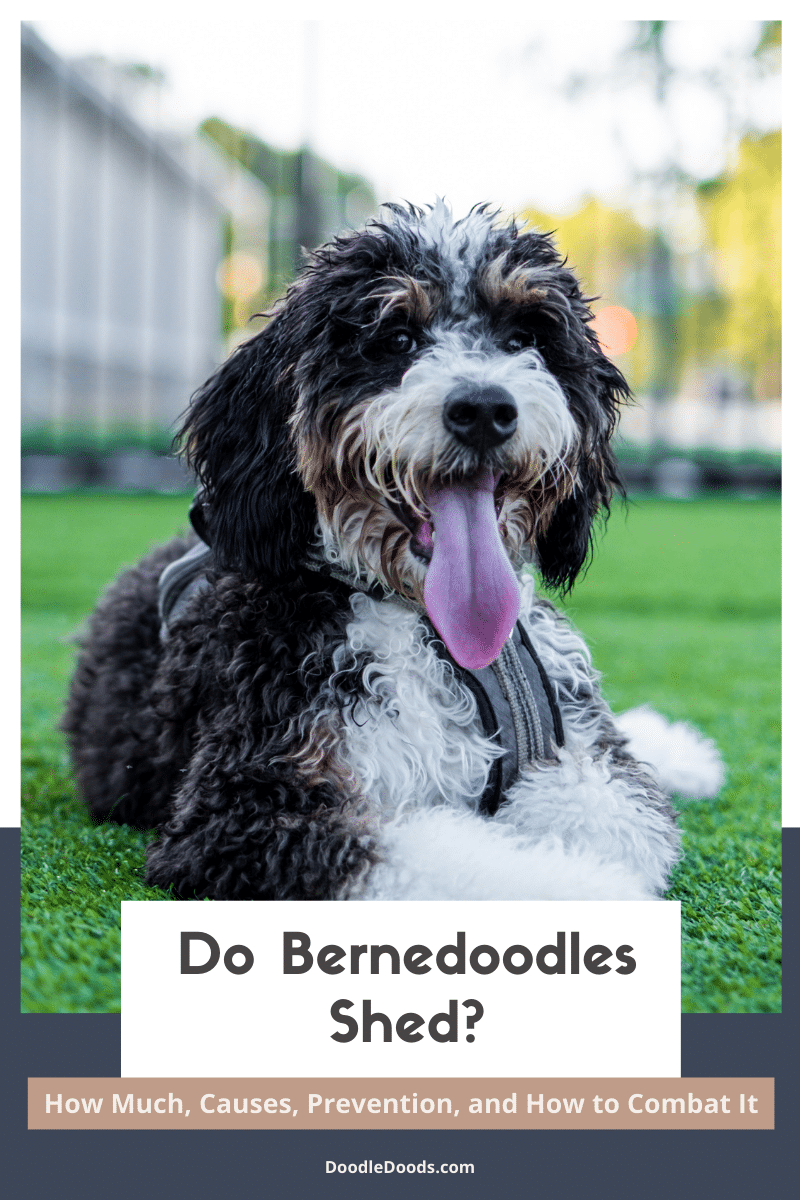



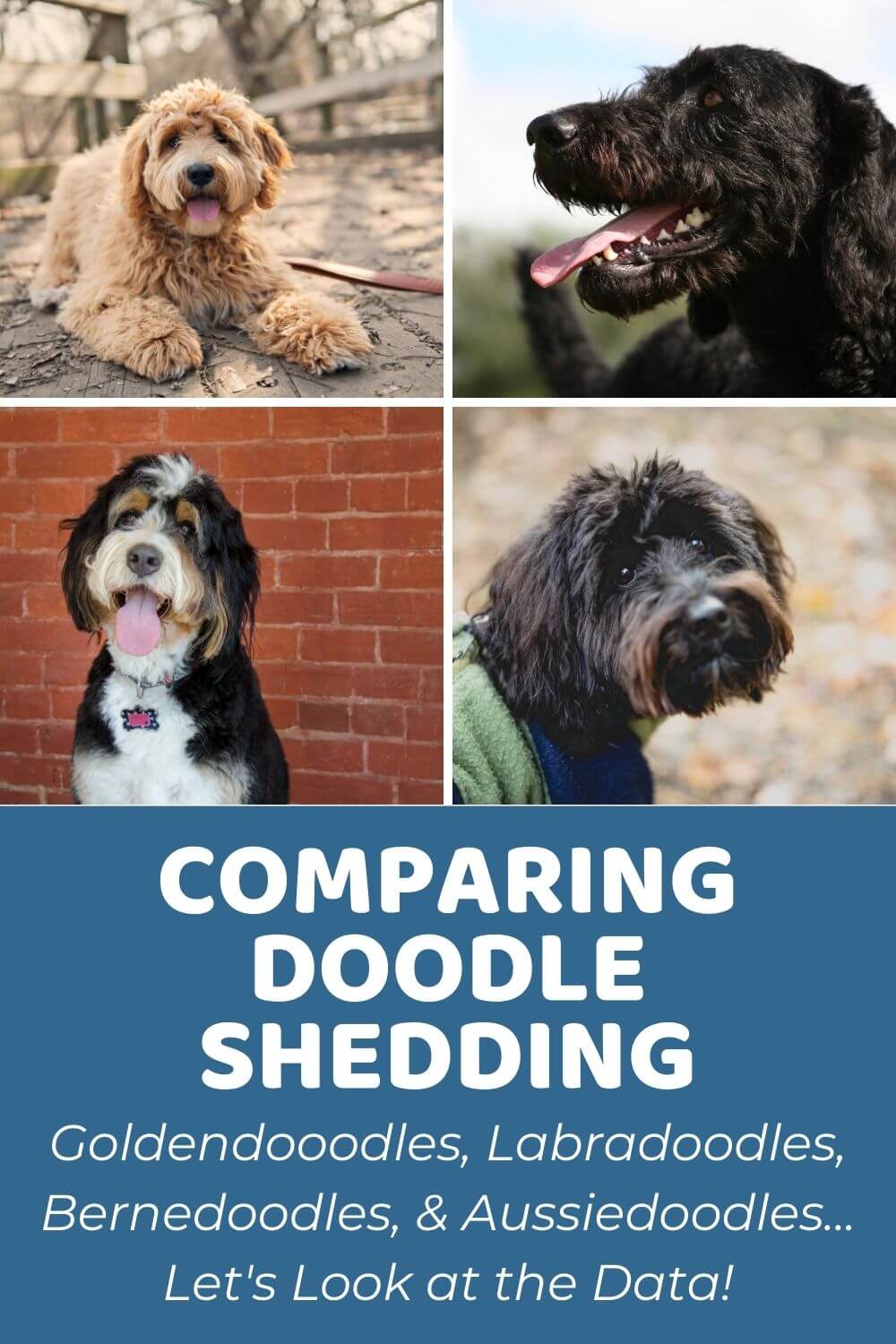
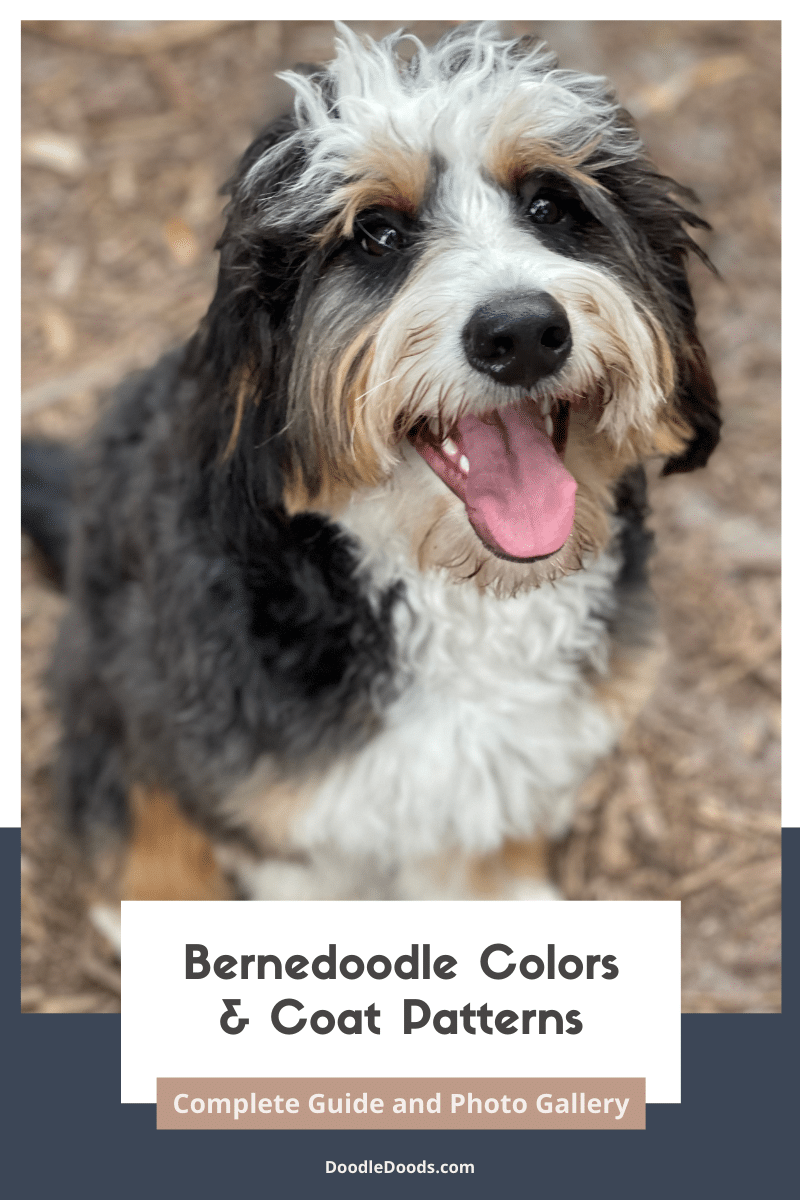
Parents of Bernedoodles: does your Dood shed and how much? Let us know in the comments below!